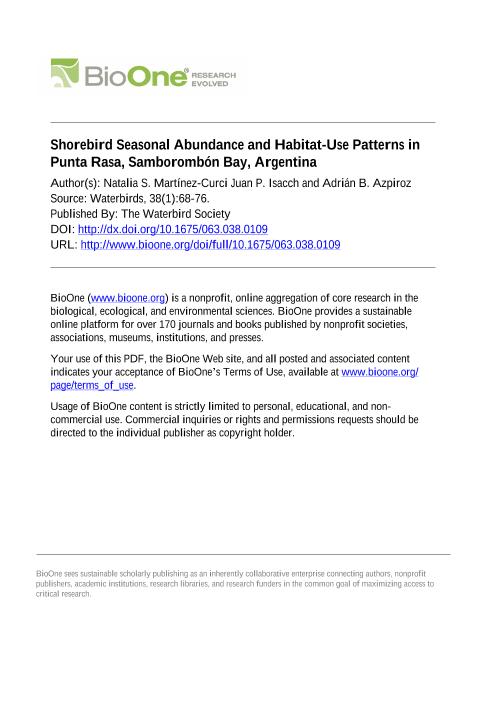Mostrar el registro sencillo del ítem
dc.contributor.author
Martínez Curci, Natalia Soledad

dc.contributor.author
Isacch, Juan Pablo

dc.contributor.author
Azpiroz, Adrian B.
dc.date.available
2018-06-29T17:30:11Z
dc.date.issued
2015-05
dc.identifier.citation
Martínez Curci, Natalia Soledad; Isacch, Juan Pablo; Azpiroz, Adrian B.; Shorebird Seasonal Abundance and Habitat-Use Patterns in Punta Rasa, Samborombón Bay, Argentina
; Waterbird Society; Waterbirds; 38; 1; 5-2015; 68-76
dc.identifier.issn
1524-4695
dc.identifier.uri
http://hdl.handle.net/11336/50690
dc.description.abstract
Shorebird assemblage composition and habitat-use patterns were characterized at Punta Rasa during the austral summer, autumn and winter. Compared to other sites within the region, this area showed high species richness, reflected by a total of 22 species recorded within a relatively short time frame. Differences in assemblage structure were driven by the use of estuarine mudflats and oceanic sandy beaches as feeding habitats. During low tide, more species used estuarine environments, achieving the highest total densities. Abundance patterns and assemblage composition also changed seasonally. Maximum total abundance occurred during the austral summer, and minimum total abundance during the austral winter. During the austral summer, the assemblage was dominated by Nearctic migrants such as American Golden-Plover (Pluvialis dominica), Hudsonian Godwit (Limosa haemastica) and White-rumped Sandpiper (Calidris fuscicollis). In addition, Two-banded Plover (Charadrius falklandicus) and American Oystercatcher (Haematopus palliatus) were abundant during the austral autumn. The Red Knot (Calidris canutus), a shorebird that dominated the austral autumn assemblage 25 years ago, was recorded in relatively small numbers during this study, probably reflecting the global population trend of a subspecies of the Red Knot (C. c. rufa) in the past two decades. During the austral winter, resident birds largely dominated the assemblage. However, it is noteworthy that some individuals of nine Nearctic migrant species remained in the area. In the case of the endangered Red Knot, Punta Rasa is, along with Lagoa do Peixe in Brazil, one of the sites in South America with the highest known abundances during the austral winter.
dc.format
application/pdf
dc.language.iso
eng
dc.publisher
Waterbird Society

dc.rights
info:eu-repo/semantics/openAccess
dc.rights.uri
https://creativecommons.org/licenses/by-nc-sa/2.5/ar/
dc.subject
Argentina
dc.subject
Migration
dc.subject
Shorebirds
dc.subject
Samborombon Bay
dc.subject.classification
Otras Ciencias Biológicas

dc.subject.classification
Ciencias Biológicas

dc.subject.classification
CIENCIAS NATURALES Y EXACTAS

dc.title
Shorebird Seasonal Abundance and Habitat-Use Patterns in Punta Rasa, Samborombón Bay, Argentina
dc.type
info:eu-repo/semantics/article
dc.type
info:ar-repo/semantics/artículo
dc.type
info:eu-repo/semantics/publishedVersion
dc.date.updated
2018-05-21T16:57:53Z
dc.identifier.eissn
1938-5390
dc.journal.volume
38
dc.journal.number
1
dc.journal.pagination
68-76
dc.journal.pais
Estados Unidos

dc.description.fil
Fil: Martínez Curci, Natalia Soledad. Consejo Nacional de Investigaciones Científicas y Técnicas. Centro Científico Tecnológico Conicet - Centro Nacional Patagónico; Argentina
dc.description.fil
Fil: Isacch, Juan Pablo. Consejo Nacional de Investigaciones Científicas y Técnicas. Centro Científico Tecnológico Conicet - Mar del Plata. Instituto de Investigaciones Marinas y Costeras. Universidad Nacional de Mar del Plata. Facultad de Ciencia Exactas y Naturales. Instituto de Investigaciones Marinas y Costeras; Argentina
dc.description.fil
Fil: Azpiroz, Adrian B.. Instituto de Investigaciones Biológicas "Clemente Estable"; Uruguay
dc.journal.title
Waterbirds

dc.relation.alternativeid
info:eu-repo/semantics/altIdentifier/url/http://www.bioone.org/doi/10.1675/063.038.0109
dc.relation.alternativeid
info:eu-repo/semantics/altIdentifier/doi/http://dx.doi.org/10.1675/063.038.0109
Archivos asociados
